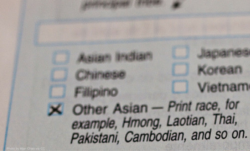Aug
9
2019
Written by TC Duong
For the 2020 Census, the Trump Administration proposed adding the following question to the form: “Is this person a citizen of the United States?” Fortunately, the Supreme Court ruled that the citizenship question should be left off the 2020 Census on June 27, 2019 and on July 11, the Trump administration said it would not pursue including the question.
Even before the Administration proposed the citizenship question, Asian American and Pacific Islander (AAPI) organizations across the United States had been mobilizing and organizing to ensure a full count of minority and immigrant communities in the 2020 Census. The census is used to allocate nearly $800 billion every year in federal funding for employment, education, medical, housing, and other resources that go to local communities and families. Census data is also a political tool that is used to reapportion the 435 seats in the House of Representatives and redraw the lines that determine congressional districts to ensure compliance with the Voting Rights Act and the constitutional principle of one-person, one vote.
The citizenship question proposed by the Trump Administration would have been a barrier to participation for immigrant and POC communities.“We are living in a climate that is hostile to immigrant communities, and these communities may already have mistrust in the government, so we do not need another barrier to participation. In fact, the Census Bureau has provided evidence that residents are fearful of responding to government surveys because of the anti-immigrant environment,“ said Mary Trablante of Asian Americans Advancing Justice (AAJC).
The historical undercount of immigrants and people of color has meant that those communities had fewer resources and resulted in electoral districts that did not reflect the actual population. In the 2010 census, outreach and mobilization efforts were scattershot and piecemeal. XP Lee, from the Minnesota Council on Foundations, said the efforts to ensure a full count in the 2010 census only started in 2009. This time around, nonprofits got ready early.
The organizing in Minnesota around Census 2020 started in 2015 with a coalition of groups that included community organizations from immigrant and POC communities as well as the State Demographer’s office, Common Cause and the League of Women Voters. According to Joseph Lachman of Asian Counseling and Referral (ACRS), Washington State also started earlier with the creation of the Washington State Census Alliance to coordinate and advocate for a full count in underserved communities.
Along with earlier coordination, the collaboratives also advocated for increased funding for census outreach because of the chilling effect of the proposed citizenship question and to ensure that census outreach and mobilization was community driven. The groups in Minnesota held listening sessions with constituents in undercounted communities to design the branding and outreach, as well as advocating for $1.6 million of funding for outreach efforts. The Washington State Census Alliance secured $15 million of funding from the state legislature for census mobilization.
When the Administration proposed adding a citizenship question to the census, it recalled historical trauma of AAPI communities due to government hostility against communities of color and immigrants. Communities were concerned about data privacy and the potential for the government to use the data from the census to target immigrants for deportation. Despite the Supreme Court’s ruling, just the possibility of the question has increased the reluctance of underserved communities to participate in Census 2020.
Michelle Lee with the Minnesota Council for Nonprofits said that the citizenship question made their collaborative even more intentional about who would be doing outreach around the census. The Minnesota coalition around a full census count has prioritized funding organizations that represent immigrant communities, serve people of color, and engage Tribal leaders in the Native American community and Hmong clan leaders.
Despite the fact that the citizenship question is off the 2020 census form, community organizations face a big challenge in repairing the trust of undercounted communities. All of the groups have had to shift their messaging about Census 2020 to address privacy concerns and to emphasize how the census can be a tool for empowerment to direct government resources to impacted communities. “We are cleaning up the damage done by the citizenship question,” said Joseph Lachman.
For more information on Census 2020 please go to: CountUsin2020.org
Building Movement Project will be hosting a webinar on Thursday, September 12 at 1:00 pm EST, 12:00 pm CST, 11:00 am MST, and 10:00 am PST on Census 2020 and the community response with XP Lee (Program Manager for Policy & Special Projects with the Minnesota Council on Foundations), Joseph Shoji Lachman (ACRS Civic Engagement Program Manager with Asian Counseling and Referral Service), and Raima Roy from Asian Americans Advancing Justice. To sign up for the webinar please visit: https://zoom.us/webinar/register/WN_FjvCYIxtQUyw5zDOsZzkTg
Image courtesy of countusin2020.org

